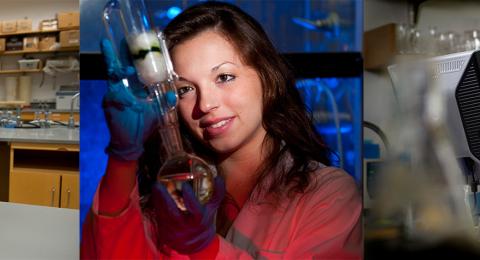Why pursue a Ph.D. in microbiology at UNH?
Our microbiology Ph.D. program combines a dynamic curriculum in a broad range of areas with interdisciplinary research opportunities at the frontiers of microbiology, host-microbe interactions and environmental microbiology. You’ll be prepared for leadership positions in biotechnology and pharmaceutical companies, and academic and government research laboratories, as well as roles in teaching and research at the college and university level.
Program highlights
We emphasize interdisciplinary research training, with opportunities in cutting-edge areas including host-microbe interactions, parasitology and immunology; environmental microbiology; signal transduction pathways; molecular microbiology; genomics and bioinformatics; microbial ecology and evolution; and biotechnology. You’ll have access to state-of-the-art instrumentation, becoming familiar with our facilities through lab rotations early in the program. We hold weekly graduate student seminar presentations, as well as a departmental seminar series of invited speakers. You’ll also enjoy opportunities to gain teaching experiences as a graduate teaching assistant.
Potential career areas
- College or university faculty
- Director of university or hospital core laboratory facilities
- Government or non-profit research institute scientist or program officer
- Research and development scientist in biotechnology or pharmaceutical industries
- Scientific writing, and communication
Curriculum & Requirements
The Ph.D. in Microbiology combines a dynamic curriculum in a broad range of areas with interdisciplinary research opportunities at the frontiers of microbiology, host-microbe interactions, and environmental microbiology. Graduates of the program are equipped for leadership positions in biotechnology and pharmaceutical companies, academic and government research laboratories, and successful careers in teaching and research at the college and university level.
Distinctive Features of the Program
- Research opportunities are available in many cutting-edge microbiology research areas
- Emphasis on interdisciplinary research training
- Well-equipped research laboratories and core facilities on the UNH campus
- Laboratory rotations upon entry to the program to become familiar with different research laboratories
- Weekly graduate student seminar presentations, as well as a departmental seminar series of invited speakers
- Opportunities to gain teaching experiences as a Graduate Teaching Assistant
Research Opportunities
- Host-microbe interactions, parasitology, and immunology
- Environmental microbiology
- Signal transduction pathways
- Molecular microbiology
- Genomics and bioinformatics
- Microbial ecology and evolution
- Biotechnology
Financial Support
- Students admitted to the Ph.D. Program are typically supported by Research Assistantships or Teaching Assistantships
- Intramural summer and academic year fellowships are available to students on a competitive basis
Career Prospects
- Research scientists in biotechnology and pharmaceutical industries
- Lab managers in academic research labs and research institutes, state and federal government agencies
- Academic preparation for future teaching and research roles in a college or university environment
Admission Requirements
- Completion of foundational courses in biology, chemistry (including organic chemistry), physics, genetics, and mathematics
- Otherwise well-qualified applicants can correct academic deficiencies with enrollment in appropriate courses or independent study during the first year of graduate studies
- Applicants from non-English speaking countries must provide Test of English as a Foreign Language (TOEFL) scores
- Three letters of recommendation
- Personal statement, including research interests and names of two or three potential Microbiology faculty thesis advisors.
Ph.D. Degree Requirements
Students with appropriate academic training at the baccalaureate or master's level may be considered for admission to the doctoral program. Students admitted to the Ph.D. program are required to conduct an independent research project in conjunction with a Microbiology graduate program faculty adviser. Specific coursework is determined in conjunction with the graduate committee.
Advancement to candidacy requires the successful completion of the following:
- All courses required by the graduate committee
- A written qualifying exam administered by the graduate program coordinator and graduate faculty
- An independent research proposal developed in conjunction with a faculty adviser
- An oral defense of the research proposal
Students enrolled in the doctoral program are required to complete one semester of teaching and successfully complete and defend a dissertation based on their research proposal. The acceptance of the dissertation is contingent on its approval by the doctoral committee and evidence that at least two manuscripts based on the thesis research have been submitted to a peer-reviewed journal appropriate to the topic.
All graduate students are required to enroll in and attend MCBS 997 Seminar each semester and present one seminar each year.
| Code | Title | Credits |
|---|---|---|
| Approved courses for the Microbiology Ph.D. and M.S. programs: | ||
| Biological Sciences | ||
| BIOL 804 | Plant-Microbe Interactions | 3 |
| Microbiology | ||
| MICR 805 | Immunology | 3 |
| MICR 815 | Immunology Laboratory | 2 |
| Genetics | ||
| GEN 804 | Microbial Genetics and Genomics | 5 |
| GEN 813 | Microbial Ecology and Evolution | 4 |
| GEN 817 | Molecular Microbiology | 5 |
| Natural Resources | ||
| NR 806 | Soil Ecology | 4 |
| Additional non-disciplinary courses to consider: | ||
| ANFS 933 | Design, Analysis, and Interpretation of Experiments | 4 |
| BCHM 825 | Cell Phenotyping and Tissue Engineering Laboratory | 4 |
| BCHM 853 | Cell Culture | 5 |
| BCHM 854 | Molecular Biology Research Methods | 5 |
| BIOL 811 | Experimental Design & Analysis | 4 |
| BIOL 902 | Writing and Publishing Science | 2 |
| BIOL 950 | Scientific Communication | 2 |
| GEN 812 | Programming for Bioinformatics | 5 |
| GRAD 891 | National Science Foundation Graduate Research Fellowship Preparation | 0 |
| GRAD 930 | Ethics in Research and Scholarship | 2 or 3 |
| MATH 835 | Statistical Methods for Research | 3 |
| MCBS 901 | Introduction to Research in the Life Sciences | 2 |
| MCBS 913 | Applied Bioinformatics | 3 |
| MCBS 910 | Cell Signaling Networks Across the Kingdoms | 3 |
| MCBS 997 | Seminar | 1 |
| NR 905 | Grant Writing | 2 |
| NR 909 | Analysis of Ecological Communities and Complex Data | 4 |
Program Learning Outcomes
All MCBS graduates will be able to:
- Critically apply theories, methodologies, and knowledge to address fundamental questions in their primary area of study.
- Pursue research of significance in the discipline or an interdisciplinary or creative project. Students plan and conduct this research or implement this project under the guidance of an advisor while developing the intellectual independence that typifies true scholarship.
- Demonstrate skills in oral and written communication sufficient to publish and present work in their field and to prepare grant proposals.
- Follow the principles of ethics in their field and in academia.
- Demonstrate, through service, the value of their discipline to the academy and community at large.
- Demonstrate a mastery of skills and knowledge at a level required for college and university undergraduate teaching in their discipline and assessment of student learning.
- Interact productively with people from diverse backgrounds as both leaders/mentors and team members with integrity and professionalism.
Graduates of the Microbiology Ph.D. degree program will be able to:
- Demonstrate strong foundational knowledge in microbiology theory and practice, and sub-disciplinary and cross-disciplinary knowledge specific to the student’s research area.
- Critically analyze and interpretate the primary literature.
- Integrate knowledge by 1) synthesizing research questions and/or hypotheses, 2) designing, executing, and interpretating research and 3) contextualizing their contributions to the field of study.
- Demonstrate competency in laboratory safety, and specialized microbiological methods.
- Promote the importance of science, the discipline of microbiology, and microbes themselves to society by communicating the meaning and value of your scholarship across formal and informal forums.
- Independently construct analytical arguments as demonstrated by the development, execution, defense and publication of a dissertation research project.
Deadlines
Applications must be completed by the following deadlines in order to be reviewed for admission:
- Fall: December 15 (priority), April 15 (final) - Applications completed by December 15 will be given priority consideration for admission and financial support with an assistantship. Applications completed after December 15 will be considered based on openings and funding. Applications are accepted until April 15, the final deadline.
- Spring: September 15 (priority), October 15 (final) - Applications completed by September 15 will be given priority consideration for admission and financial support with an assistantship (applications are accepted until October 15, the final deadline). Please note that most assistantships are awarded for Fall admission; however, assistantships may be available for Spring admission based on funding availability. Students can contact the department before applying to get up-to-date information on the availability of financial support.
- Summer: N/A
- Special: N/A
Application fee: $65
Campus: Durham
New England Regional: No
Accelerated Masters Eligible: No
New Hampshire Residents
Students claiming in-state residency must also submit a Proof of Residence Form. This form is not required to complete your application, but you will need to submit it after you are offered admission, or you will not be able to register for classes.
Transcripts
If you attended UNH or Granite State College (GSC) after September 1, 1991, and have indicated so on your online application, we will retrieve your transcript internally; this includes UNH-Durham, UNH-Manchester, UNH Non-Degree work and GSC.
If you did not attend UNH, or attended prior to September 1, 1991, then you must upload a copy (PDF) of your transcript in the application form. International transcripts must be translated into English.
If admitted, you must then request an official transcript be sent directly to our office from the Registrar's Office of each college/university attended. We accept transcripts both electronically and in hard copy:
- Electronic Transcripts: Please have your institution send the transcript directly to grad.school@unh.edu. Please note that we can only accept copies sent directly from the institution.
- Paper Transcripts: Please send hard copies of transcripts to: UNH Graduate School, Thompson Hall- 105 Main Street, Durham, NH 03824. You may request transcripts be sent to us directly from the institution or you may send them yourself as long as they remain sealed in the original university envelope.
Transcripts from all previous post-secondary institutions must be submitted and applicants must disclose any previous academic or disciplinary sanctions that resulted in their temporary or permanent separation from a previous post-secondary institution. If it is found that previous academic or disciplinary separations were not disclosed, applicants may face denial and admitted students may face dismissal from their academic program.
Letters of recommendation: 3 required
Recommendation letters submitted by relatives or friends, as well as letters older than one year, will not be accepted.
Personal Statement/Essay Questions
Prepare a brief but careful statement that includes the following: 1) the reasons you wish to do graduate work in this field, including your immediate and long-range objectives, 2) your specific research or professional interest and experiences in this field, and 3) a review of MCBS graduate program faculty research descriptions and the identification by name of two or three potential mentors for your graduate studies.
Statements must be included with your submitted application.
Additional Department Requirements
Please note the GRE is no longer required. No GRE score is needed to apply.
Important Notes
All applicants are encouraged to contact programs directly to discuss program-specific application questions.
International Applicants
Prospective international students are required to submit TOEFL, IELTS, or equivalent examination scores. English Language Exams may be waived if English is your first language. If you wish to request a waiver, then please visit our Test Scores webpage for more information.




















